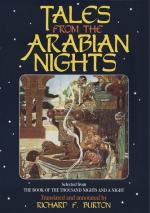[FN#73] Surah li. (The Scattering), v. 56.
[FN#74] Surah ii. v. 30.
[FN#75] Surah xl. (The Believer), v. 78. In the text it is fragmentary. I do not see why Mr. Rodwell founds upon this verset a charge against the Prophet of ignorance concerning Jewish history: Mohammed seems to have followed the Talmud and tradition rather than the Holy Writ of the Hebrews.
[FN#76] Surah (The Believers) lxiv. 108.
[FN#77] Surah xxxv. (The Creator or the Angels), v. 31: The sentence concludes in v. 32, “Who of His bounty hath placed us in a Mansion that shall abide for ever, therein no evil shall reach us, and therein no weariness shall touch us.”
[FN#78] Surah ("Sad”) lix. 54; Iblis, like Satan in the Book of Job, is engaged in dialogue with the Almighty. I may here note that Scott (p. 265) has partially translated these Koranic quotations, but he has given only one reference.
[FN#79] In text “Ana min ahli zalika,” of which the vulgar equivalent would be “Kizi” (for “Kazalika,” “Kaza”) = so (it is)!
[FN#80] i.e. On an empty stomach, to “open the spittle” is = to break the fast. Sir Wm. Gull in his evidence before a committee of the House of Commons deposed that after severe labor he found a bunch of dried raisins as efficacious a “pick-me up” as a glass of stimulants. The value of dried grapes to the Alpinist is well known.
[FN#81] Arab. “Al-Kadid” = jerked (charqui = chaire cuite) meat-flesh smoked, or (mostly) sun-dried.
[FN#82] I have noticed (i. 345) one of the blunders in our last unfortunate occupation of Egypt where our soldiers died uselessly of dysenteric disease because they were rationed with heating beef instead of digestible mutton.
[FN#83] Arab. “Al-Marham al-akbar.”
[FN#84] [In the text: “Al-Kisrat al-yabisah ’ala ’l-Rik fa-innaha tukhlik jami’a ma ’ala fum al-madah min al-balgham,” of which I cannot make anything but: a slice of dry bread (kisrah = piece of bread) on the spittle (i.e. to break the fast), for it absorbs (lit. uses up, fourth form of “khalik” = to be worn out) all that there may be of phlegm on the mouth of the stomach. Can it be that the dish “Khushk-nan” (Pers. = dry bread) is meant, of which the village clown in one of Spitta Bey’s tales, when he was treated to it by Harun al-Rashid thought it must be the “Hammam,” because he has heard his grandmother say, that the Hammam (bath) is the most delightful thing in the world? St]
[FN#85] The stomach has two mouths, oesophagic above (which is here alluded to) and pyloric below.
[FN#86] Arab. “’Irk al-Unsa” = chordae testiculorum, in Engl. simply the cord.
[FN#87] The “’Ajuz” is a woman who ceases to have her monthly period: the idea is engrained in the Eastern mind and I cannot but believe in it seeing the old-young faces of men who have “married their grandmothers” for money or folly, and what not.




